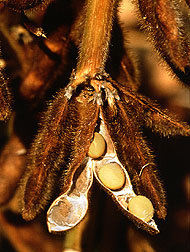This page has been archived and is being provided for reference purposes only. The page is no longer being updated, and therefore, links on the page may be invalid.
|
|
Gene Marker for Flood-Tolerant SoybeansBy Don ComisDecember 28, 1999 A marker that points to genes responsible for flood tolerance in soybeans has been identified by an Agricultural Research Service scientist. ARS plant physiologist Tara T. VanToai, at the Soil Drainage Research Unit in Columbus, Ohio, reported that plants with the genetic marker had a 50 percent yield advantage after spending their flowering stage in waterlogged soil for two weeks. The two-year study involved 208 soybean lines. For confirmation, more plants will be field-tested in Arkansas and Ohio. Biotechnology advances have led breeders to use the markers, made of genetic material called DNA, for selecting promising plants. The markers are linked to genes for desired traits. Breeders look for the DNA marker in tissues taken from seedlings, without growing the plants any further. This avoids having to wait an entire growing season to screen a mature plant. VanToai is conducting other field and greenhouse tests to find soybean germplasm lines that contain additional genes for further yield increases in flooded fields. VanToai and colleagues from the University of Arkansas at Fayetteville, University of Utah at Salt Lake City, and Ohio State University at Columbus are doing the work jointly, as part of a national soybean genome mapping project partly funded by the United Soybean Board. ARS is the chief scientific research agency of the U.S. Department of Agriculture. Scientific contact: Tara T. VanToai, ARS Soil Drainage Research Unit, Columbus, Ohio, phone (614) 292-9806, fax (614) 292-9448, vantoai.1@osu.edu. |

